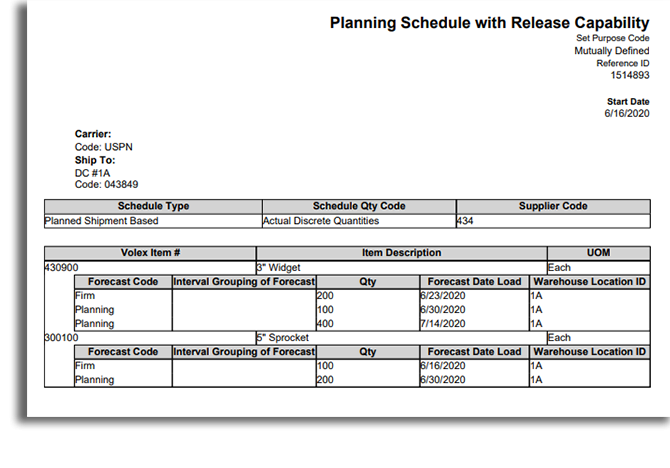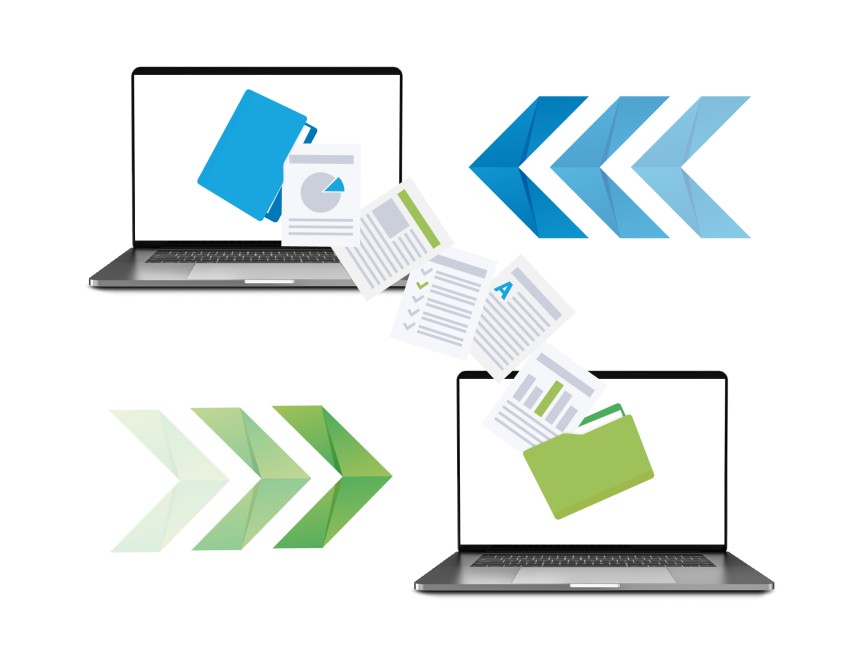EDI 830
Planning Schedule with Release Capability

What is an EDI 830?
An EDI 830 is also known as a Planning Schedule with Release Capability. This EDI transaction set is usually sent from a manufacturer to one of their vendors/suppliers, and details anticipated needs for a specified period of time. Suppliers may use the information on this EDI document to automatically fulfill orders based on manufacturer needs, which is especially useful for suppliers using a Just-in-Time Inventory approach.
EDI 830 documents follow the x12 format set by the American National Standards Institute (ANSI), a not-for-profit organization that regulates EDI formats in the U.S.
What are the Essential Components of EDI 830?
EDI 830 can be used as a simple forecast or include elements such as resource authorizations or authorization to fulfill orders, as specified by the manufacturer (buyer). As such, the transaction can include a wide range of details, such as:
- Manufacturer and supplier identification details
- A forecast schedule, including product needs, which may indicate frequency and quantity of need and whether the needs are firm or for planning purposes.
- Product identifying information such as SKUs, model numbers, and other specifications
- Resource authorizations or order release authorization
- Specialized delivery instructions
- Shipping information


How Do I Use EDI 830?
When a manufacturer establishes a long-term partnership with a supplier or vendor, they may need the same products repeatedly, perhaps at regular intervals. The EDI 830 document serves as a sales forecast for the supplier, letting them know about the manufacturer’s needs for the coming weeks and months. EDI 830 is also called a Planning Schedule, precisely because it enables the supplier to plan ahead for upcoming orders and shipments.
The second aspect of the document is the Release Capability. In this capacity, the EDI 830 can be used to authorize the supplier to automatically fill orders based on manufacturer inventory needs, according to agreed-upon terms. In the EDI 830, the manufacturer can authorize the use of resources, as well as specify shipment periods or delivery patterns that a supplier should follow.
Upon receiving EDI 830, suppliers will commonly respond with an EDI 997 Functional Acknowledgement.
What are the Benefits of EDI 830?
EDI 830, like all EDI documents, provides a secure way for vendors and manufacturers to communicate, while also providing all the benefits of automation. Using EDI 830 can streamline partner communications, enabling faster and more accurate fulfillment to ensure that the right products are in the right place at the right time.
EDI 830 in particular can help enhance supplier enablement and collaborative replenishment by giving suppliers the information they need to fill orders automatically during specified intervals. The document gives partners better visibility into a manufacturer’s needs, so they can anticipate upcoming orders, while giving suppliers better data for their own sales forecasts.
EDI Format Example
EDI 830 can be viewed in two formats – a human “readable” version and a “raw” data version. The example below shows the raw EDI data, which is usually translated using integrated EDI software, and then sent to your business system (ERP) for use by your EDI manager or other employees.
- Click to See Example
-
ISA*00* *00* *ZZ*VLXEDITEST *12*9622309900 * * *U*00401* *0*T*>
GS*PS*VLXEDITEST*9622309900*20200616*0940**X*004010
ST*830
BFR*ZZ*1514893**PS*A*20200616
REF*IA*434
N1*CA***USPN
N1*ST*DC #1A*ZZ*043849
LIN**IN*430900
UIT*EA
PID*F****3″ Widget
FST*200*C**20200623*****1A
FST*100*D**20200630*****1A
FST*400*D**20200714*****1A
LIN**IN*300100
UIT*EA
PID*F****5″ Sprocket
FST*100*C**20200616*****1A
FST*200*D**20200630*****1A
SE*17
GE*1
IEA*1*
